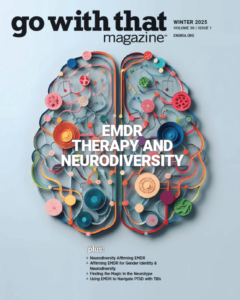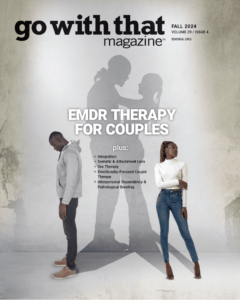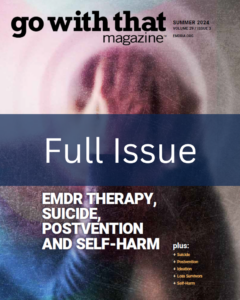Using EMDR to Treat PTSD Associated with Traumatic Brain Injury: Navigating a Changed Brain and Sense of Self
With an ever-growing list of diagnoses under the neurodiverse umbrella, what does this mean for how we practice EMDR?
Read MoreCommunity Voices: Neurodiverse Clients
EMDR therapists respond to how aspects of a client’s culture/race are meaningful as a resource/challenge in using EMDR with neurodiverse clients.
Read MoreCounselor’s Corner: ADHD Medications
EMDR therapists respond to the question “Does anyone have any insight on clients taking stimulant medications for ADHD…?”
Read MoreEMDR Therapy for Couples (Go With That Magazine® Issue)
In this issue, we explore EMDR therapy in couples therapy: helping partners navigate past wounds, improve communication, and rebuild trust.
Read MoreCounselor’s Corner: Crying Clients
EMDR therapists respond to the question “How do you handle crying clients? My client started crying during desensitization…”
Read MoreCommunity Voices: EMDR and Couples
EMDR therapists respond to how aspects of a client’s culture/race are meaningful as a resource/challenge in using EMDR with couples.
Read MoreIntegrating EMDR and Couples Therapy
Integrating EMDR therapy into couples therapy is a promising new trend in psychotherapy, though it presents challenges.
Read MoreIntegrating EMDR in Emotionally-Focused Couple Therapy
This article explores how individual EMDR therapy could be modified for couples to possibly expand its potential for healing.
Read MoreSex Therapy Treatment for a Couple in a Sexless Relationship: EMDR and CBT Therapy, the Perfect Therapeutic Couple
Combining EMDR and CBT can be effective as a duo, and even referred to as a match made in heaven or the perfect therapeutic couple.
Read MoreTreating Interpersonal Dependency and Pathological Bonding Patterns (ID-PBP) with EMDR
This article examines how EMDR can help heal the effects of interpersonal dependency and pathological bonding.
Read MoreEMDR Therapy, Suicide, Postvention and Self-Harm (Go With That Magazine™ Issue)
Find out how EMDR therapy can help clients alleviate symptoms that contribute to suicidal ideation in this issue of Go With That Magazine™.
Read More




